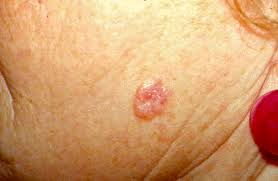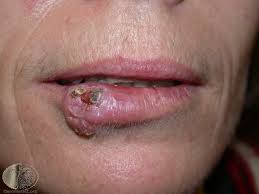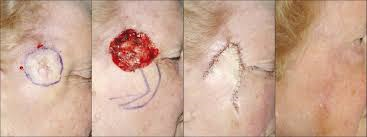There are many types of facial skin lesions. Some are treated for cosmetic purposes but the main concern is the fact they the lesions may be either pre-cancerous or cancerous.
Skin cancer is the most
common cancer in the
Basal cell carcinoma (BCC)
 This
is the most common skin cancer in white and fair-skinned people.
BCC is rare in dark-skinned people. BCC is more common in older
people. Those aged over 75 years are about five times more likely
to have a BCC than those people aged between 50-55 years.
This
is the most common skin cancer in white and fair-skinned people.
BCC is rare in dark-skinned people. BCC is more common in older
people. Those aged over 75 years are about five times more likely
to have a BCC than those people aged between 50-55 years.
They typically develop on a sun-exposed
area of the skin such as the head and neck. However, one can
develop on any area of skin. The first sign is often a small red,
pink or pearly lump which appears on previously normal skin. The
lump is often dome-shaped. However, BCCs can vary in shape and
colour. They usually grow very slowly and and it can take many
months for one to grow to a centimetre or more.
Squamous cell carcinoma (SCC)
 This
is the second most common skin cancer in white and fair-skinned
people. SCC is rare in dark-skinned people. Like BCCs, SCCs are
more common in older people. Those aged over 75 years are about
thirty-five times more likely to have an SCC than those aged
between 50-55 years.
This
is the second most common skin cancer in white and fair-skinned
people. SCC is rare in dark-skinned people. Like BCCs, SCCs are
more common in older people. Those aged over 75 years are about
thirty-five times more likely to have an SCC than those aged
between 50-55 years.
An SCC typically develops on the face,
most commonly on or around
the ears or lips. However, any area of skin can be affected. It
typically starts as a small crusted or scaly area or skin with a
red or pink base. It may grow into a lump which may look like a
wart. An SCC may ulcerate or bleed from time to time. However, an
early SCC can vary in shape, appearance and colour.
For superficial lesions these may sometimes be treated with curretage or cryotherapy (although neither of these is often recommended), Photodynamic therapy (PDT) can also be useful in superficial BCC's.
Treatment often involves surgery, which may also involve some element of skin grafting or reconstructive surgery. A type of surgery called Moh's surgery is sometiems advised, particularly in areas close to critical areas and in difficult or reccurent cases.

Radiotherapy may sometimes be used in addition to, or instead of surgery in some case.
